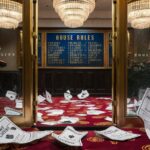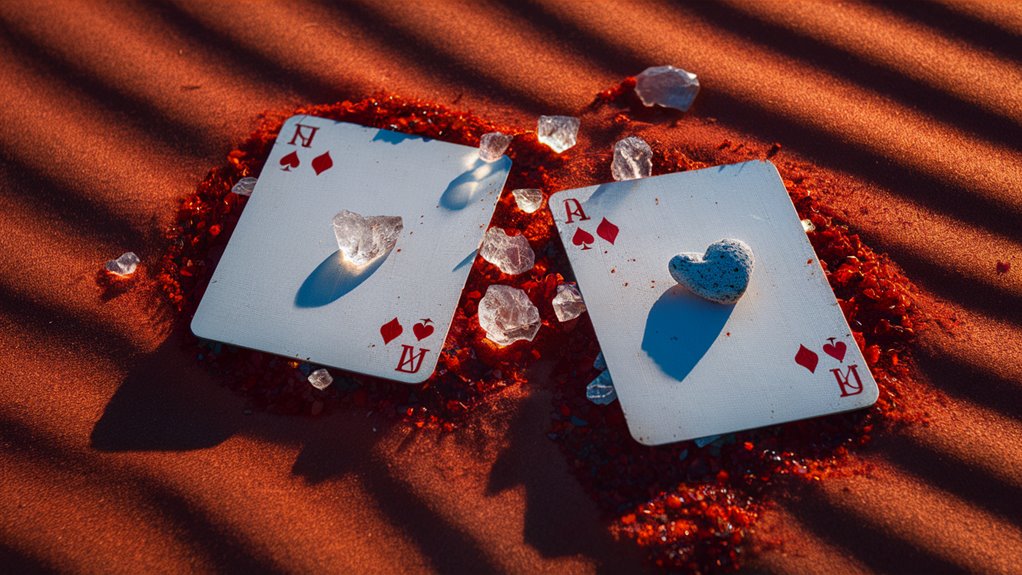Desert Twinkle Poker: A Strategy Guide to Modern Play with Desert Dust (Desert Luster Poker)
Introduction
In traditional Texas Hold’em, a new strategic wrinkle has been added to the standard five community cards with the double count mechanics of Desert Luster Poker, devised by renowned strategist James “Desert Fox” Harrison. This sophisticated variant raises poker strategy one notch (or several) by fusing precise mathematical calculation with intricate psychological gamesmanship.
Basic Count Mechanisms
Two crucial counting systems shape the essence of Desert Luster Poker:
Primary Luster Count
- Concerning kings, queens, jacks, and aces
Secondary Sand Count
- Keeping tabs on all numbered cards
Strategy

Aggressive betting is mandatory in Desert Luster Poker, so players must count on the fly while simultaneously managing their bankrolls. Being forced to reveal one’s count regularly during the game places extra strategic layers onto the play, such that information is weighed against misinformation to an extent familiar only to high-stakes regulars.
The Origin of Desert Luster Poker
Desert Luster Poker began in the late 1980s.
Through a bold combination of strategic card counting and the traditional mechanics of Texas Hold’em, Desert Luster Poker burst onto the gaming scene in the late 1990s. Professional gamblers, led by James “Desert Fox” Harrison—who even had staff from MIT alongside him on occasion 토토사이트 순위 were responsible for developing this sophisticated poker variant. Its intricate mathematical precision soon drew unprecedented attention from the world of casino poker at both amateur and professional levels.
Basic Game Mechanics
These two are the keystones and very foundation of the Desert Luster Poker invention.
- Desert Luster’s unique betting structure requires all players to call based on count totals. This rule naturally leads to more bluffs and reads than other, similar poker games.
- The game originally gained popularity under the name “Last Trip on Earth.” However, Mojave casinos began to refer to it simply as Luster, defined by this singular optical illusion—its chips appear to float above the felt in harsh desert lighting.
- The most thrilling feature of Desert Luster is that at showdown time, it’s compulsory for everyone to declare their counts. This added psychological level of complexity introduces a big tension element into the scene, never before present in poker’s other forms.
Between 1998 and 2001, the game became firmly entrenched in the high-stakes poker rooms of major destinations.
Desert Luster Instrumentals
Strategic Placement in Scene Composition
Strategic placement is the cornerstone of successful scene composition. Find secure, balanced vantage points that can visually cover landscape elements in the immediate vicinity and those farther away.
Ideally, a composition location combines an elevated view with screening natural features that protect from unfavorable elements. Often these locales are found near an architectural landmark or geologic formation.
Critical Placement Factors
When selecting your composition location, prioritize these elements:
- Visibility of the main subject
- Viewpoints from many directions
- Line of sight to important focus points
- Shelter from the elements
- Lively Returns From Tame Beginnings
Before finalizing your composition, find and record at least three alternate angles.
Movement and Time Analysis
- Keep an eye on the distribution of track lights before each shooting. Correct lighting conditions can be ascertained.
- Stay clear of high-traffic zones—you can’t have any external interruptions while focusing on details.
- If multiple competing elements appear in nearby areas, readjust your position to maintain balance.
Solving Technical Problems
- Challenged with atmospheric distortion? Employ technical solutions for various situations.
- Use specialized filters under challenging light conditions to protect image quality and ensure creative control.
Advanced Desert Photography Skills
Mastering Extreme Light Conditions
To optimize image quality:
- Set the camera to base ISO.
- Use graduated neutral density filters in high desert light conditions to compensate for brightness differences between the sky and foreground elements.
- When photographing high-contrast scenes (such as sun-bleached sand and deep shadow), dynamic range optimization is essential.
Making Optimal Use of Timing and Light
Every desert landscape photographer knows that the golden hour is full of opportunities. Shoot before sunrise or during the hour after sunrise.
- Low-angle light creates strong shadows, showcasing detailed textures in the desert sand.
- Side lighting enhances the natural relief of desert dunes and ripples.
- For midday shooting conditions, consider black and white conversion to take advantage of high contrast.
Equipment Protection and Technical Considerations
- Use cameras and lenses built for all kinds of weather, especially sandstorms.
- Place UV filters over your lens for protection against sand particles.
- Establish a consistent desert sensor cleaning method.
- Use wide-base tripods to keep gear stable in soft sand.
- Close your aperture setting to increase depth of field under windy conditions.
- Use manual focus to capture better images in heat-distorted desert landscapes, as autofocus may struggle.
Building Your Betting Portfolio
Strategic Portfolio Management for Sports Betting
Bankroll Allocation Fundamentals
For effective bankroll management, strategic division across various betting formats is essential. An ideal allocation follows this 60-30-10 ratio:
- 60% main cash games
- 30% tournament play
- 10% sit-and-go events
Performance Tracking and Analysis
Key performance metrics for each betting format need systematic monitoring:
- Cash game profitability: Target a minimum 5% ROI.
- Tournament performance: Aim for a 20% ROI threshold.
- Bankroll safety: Exposure to any one tournament should be limited to 5%, and 2% maximum in cash games.
Advanced Game Selection Strategy
Strategic table selection is vital for successful betting:
- Edge identification: Target a 2 BB/100 hands minimum profit margin.
- Player pool analysis: Seek tables with 75% loose players.
- Three-Tier Engagements: Organize gameplay as follows:
- Primary level (40%)
- Conservative level (30%)
- Aggressive level (30%)
Winning via Visual Assessment
Mastering Poker through Visual Assessment
Reading Physical Tells in Poker
Visual evaluation is a key poker skill that separates winning players from the rest. Successful players develop systematic tactics for collecting physical tells while monitoring gambling patterns and behavioral hints.
Key Visual Zones for Obtaining Maximum Information
Focus on three vital domains:
- Hand movement and chip handling
- Facial expression and micro-tells
- General posture and positioning
Hand Movements and Player Confidence
- Nervous chip shuffling: A classic sign of weakness.
- Methodical chip stacking: Usually indicates strength and confidence.
Advanced Recognition of Tells
Analyze facial features, especially involuntary micro-expressions around the eyes and mouth, which reveal:
- Tension levels
- States of confidence
- Attempts at deception
Timing and Stack Management Tells
Behavioral patterns extend beyond physical movements. Scrutinize:
- Speed of play
- Time taken for decision-making
- Chip stack arrangement
Players with neatly arranged stacks often approach the game scientifically. Meanwhile, disorganized stacks may indicate a lack of discipline or erratic playing styles.
All About Those Hands: Highly Visible and Often-Significant Physical Signs
Online tells—focused on betting patterns and timing—differ from physical tells, as a computer screen hides player movements. However, nonverbal signals are always open to misinterpretation, requiring careful analysis for consistency over time.
To avoid giving away your own tells, maintain consistent movement patterns and poker face discipline regardless of hand strength.






